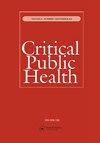How work impacts health and smoking practices among sexuality and gender minority young adults
IF 2.3
3区 医学
Q2 PUBLIC, ENVIRONMENTAL & OCCUPATIONAL HEALTH
引用次数: 0
Abstract
ABSTRACTWhile work has been established as an important social determinant of health, it remains understudied in health inequities research. Although work has the potential to both promote and harm health, this analysis focuses on the health-compromising elements of work in a sample of sexuality and gender minority (SGM) young adults in the San Francisco Bay Area who participated in a study investigating nicotine and tobacco (NT) use practices. Survey and interview data were collected from 100 participants ages 18–25 who reported current or former NT use. In-depth qualitative interviews explored their experiences of daily life, social identities and beliefs about structural oppression, practices of NT use, and perceptions of health and wellbeing. A thematic analysis of the narratives highlighted the centrality of work to daily life. Participants described how work structured time and became a site of daily exploitation. They also identified the structural barriers that shape employment opportunities for SGM young adults, compromising health, and shaping NT use. Results elucidate the harmful practices embedded in daily work and the inequities within the structure of work itself, underscoring the need to shift focus away from individual behaviors like NT use and towards the structural factors that perpetuate health inequities.KEYWORDS: Social determinants of healthhealth inequitiessexuality and gender minoritiesworksmoking AcknowledgementsSincere appreciation goes to the 100 study participants who willingly gave their time to participate in this study.Disclosure statementThe authors report there are no competing interests to declare.Data availability statementDue to problems associated with anonymizing participants’ narrative data, the dataset has not been approved by the IRB to be deposited in a publicly available data repository. However, interested parties may contact the principal Investigator, Tamar Antin at tamar@criticalpublichealth.org to request anonymized data and study materials.Additional informationFundingThis research and preparation of this manuscript were supported by grant #T30IR0890 from the California Tobacco-Related Disease Research Program (TRDRP). The content is solely the responsibility of the authors and does not necessarily represent the official views of TRDRP.工作如何影响性取向和性别少数群体年轻人的健康和吸烟习惯
摘要虽然工作已被确定为健康的重要社会决定因素,但在健康不平等研究中仍未得到充分研究。虽然工作有促进健康和危害健康的潜力,但本分析侧重于旧金山湾区性取向和性别少数群体(SGM)年轻人样本中的健康危害因素,他们参加了一项调查尼古丁和烟草(NT)使用习惯的研究。调查和访谈数据收集自100名年龄在18-25岁的参与者,他们报告目前或以前使用过NT。深入的定性访谈探讨了他们的日常生活经历、社会身份和对结构性压迫的信念、使用NT的做法以及对健康和福祉的看法。对这些叙述的专题分析强调了工作在日常生活中的中心地位。参与者描述了工作如何安排时间,并成为日常剥削的场所。他们还确定了影响SGM年轻人就业机会、损害健康和影响NT使用的结构性障碍。研究结果阐明了日常工作中存在的有害做法和工作结构本身的不公平现象,强调需要将重点从使用NT等个人行为转向使卫生不公平现象长期存在的结构性因素。关键词:健康的社会决定因素健康不平等性与少数性别工作吸烟致谢衷心感谢100位自愿参与本研究的研究参与者。作者报告无利益竞争需要申报。数据可用性声明由于匿名化参与者叙述数据的相关问题,数据集尚未得到IRB的批准,无法存放在一个公开可用的数据存储库中。但是,感兴趣的各方可以通过tamar@criticalpublichealth.org联系首席研究员Tamar Antin,要求匿名数据和研究材料。本研究和本文的准备由加州烟草相关疾病研究计划(TRDRP)的#T30IR0890基金支持。内容完全是作者的责任,并不一定代表TRDRP的官方观点。
本文章由计算机程序翻译,如有差异,请以英文原文为准。
求助全文
约1分钟内获得全文
求助全文
来源期刊

Critical Public Health
Multiple-
CiteScore
5.90
自引率
7.10%
发文量
36
期刊介绍:
Critical Public Health (CPH) is a respected peer-review journal for researchers and practitioners working in public health, health promotion and related fields. It brings together international scholarship to provide critical analyses of theory and practice, reviews of literature and explorations of new ways of working. The journal publishes high quality work that is open and critical in perspective and which reports on current research and debates in the field. CPH encourages an interdisciplinary focus and features innovative analyses. It is committed to exploring and debating issues of equity and social justice; in particular, issues of sexism, racism and other forms of oppression.
 求助内容:
求助内容: 应助结果提醒方式:
应助结果提醒方式:


